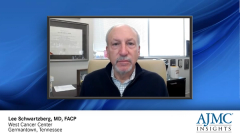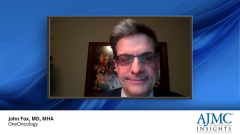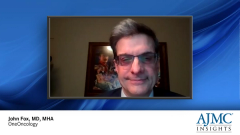
CIN Prophylaxis: NCCN’s Reactions to COVID-19
Best practices for treating patients with cancer who are receiving chemotherapy to reduce the risk for chemotherapy-induced neutropenia during the COVID-19 pandemic, as recommended by modified NCCN guidelines.
Episodes in this series

Lee Schwartzberg, MD, FACP: As I mentioned, the NCCN [National Comprehensive Cancer Network] has a guideline committee for the use of myeloid growth factors after myelosuppressive chemotherapy to reduce the incidence of CIN [chemotherapy-induced neutropenia] and FN [febrile neutropenia].
In the spring after the COVID-19 [coronavirus disease 2019] pandemic was becoming full blown, the NCCN modified their guidelines and recommend the use of prophylactic G-CSF [granulocyte colony-stimulating factor] in patients who were receiving intermediate-risk regimens in that 10% to 20% risk range. A lot of different chemotherapies are in that risk range that may or may not get a prophylactic G-CSF regimen along with it.
Based on that, we received reimbursement for patients receiving growth factors even for those intermediate-range myelosuppressive regimens, which was not always a given prior to this emergency usage of G-CSF as recommended by NCCN. The reason they recommended it in the intermediate-range group is we did not want patients receiving chemotherapy for cancer to have to make additional visits, either to the clinic or even worse to the hospital where resources were so strained by the COVID-19 pandemic and have to be admitted for preventable neutropenia and complications. In my own clinic, we did implement this, and we have seen a reduction in the incidence of moderate or severe CIN while giving growth factors to these patients who frequently need it. This has been a savings all around. We have not increased morbidity to our patients. We have not exposed them to the possibility of getting COVID-19 in the hospital. And we’ve reduced the stress on the hospital system, particularly now as we’re talking in late November 2020, where COVID-19 is unfortunately spiking and threatening to overwhelm our hospital resources and our health care workers. We do not need to have patients who could be prevented from being in the hospital because of febrile neutropenia, if they got prophylaxis to not have had it. That’s what we’re doing currently. The NCCN and ASCO, [the American Society of Clinical Oncology] by the way, which released similar guidelines, did a great service to the cancer community by modifying their guidelines.
Where in the past we might have asked patients to come back in for a complete blood count at their time of nadir, at day 8, or at day 10, or at day 12, or 14, or even come in a couple of times to get blood counts, each time they come to the clinic, they’re coming to a situation where they may be exposed to others with COVID-19. Based on essentially the ongoing mandate to reduce exposures, particularly for vulnerable populations, and patients with cancer are among the most vulnerable populations given that they have impaired immune systems to begin with and many of them are older, these are exactly the type of individuals we don’t want to increase exposure for any means to the potential of getting COVID-19. Reducing their need to come in for a blood count check is one way to do that, and by giving patients G-CSF prophylaxis beforehand, that does away with the need to have them come back and check their neutrophil count.
We do ask patients to monitor their fever, and if they don’t feel well, they should certainly take their temperature, particularly during that time when they might be at highest risk for chemotherapy-induced neutropenia and febrile neutropenia. The COVID-19 pandemic has also complicated matters for patients who do get neutropenia and fever because we frequently don’t know if that’s standard FN due to their chemotherapy and we’re treating them that way, or whether it could be COVID-19 and the first manifestation of it. This leads to more care and distress in trying to determine that. And we’re testing those patients for COVID-19 when they come in with fever and neutropenia, just to make sure we’re not missing that as well.
Newsletter
Stay ahead of policy, cost, and value—subscribe to AJMC for expert insights at the intersection of clinical care and health economics.







